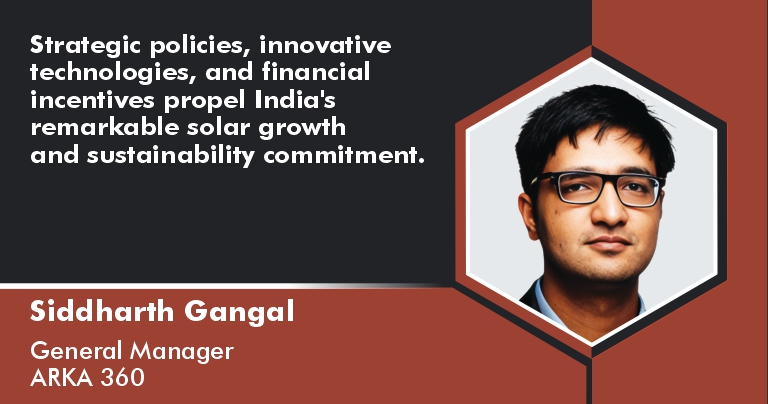India paves the way to a green energy revolution with 67.07 GW solar capacity
By EPR Magazine Editorial December 26, 2023 4:50 pm IST
By EPR Magazine Editorial December 26, 2023 4:50 pm IST

Strategic policies, innovative technologies, and financial incentives propel India’s remarkable solar growth and sustainability commitment.
India, a global solar energy frontrunner with 67.07 GW installed capacity, is dedicated to a sustainable future and propelled by robust policies, incentives, and innovative strategies, India pioneers the shift towards a greener power grid. Siddharth from Arka 360 shares his views regarding the emerging renewable sector in the country.
A global frontrunner in solar energy
India, a global frontrunner in solar energy, boasts an impressive 67.07 GW installed capacity, ranking fourth worldwide. Amidst conventional energy dominance, India is unwavering in its commitment to renewables. Focused on enhancing infrastructure, deploying cutting-edge technologies, and enacting progressive policies, the nation seamlessly integrates solar power into its grid. Beyond electricity, India’s solar revolution signifies a commitment to a cleaner, more resilient, and prosperous future. By embracing solar, India is at the forefront of pioneering sustainability, heralding a brighter tomorrow.
India’s transition to a green energy grid
India’s journey to a green energy grid demands strategic enhancements, upgraded infrastructure for improved power flow and flexibility, technology adoption for optimised grid management and efficient energy storage utilisation, policy reforms to encourage renewable energy development and seamless grid integration, and market mechanisms enabling effective power trading and capacity management. These pillars form the foundation for India’s sustainable energy future, driving progress and innovation in pursuing a greener and more resilient power grid.
Policies and initiatives contributing to the expansion of RE
A robust policy framework and various incentives reinforce India’s commitment to green energy. Implementing Renewable Purchase Obligations (RPOs) mandates a percentage of electricity from renewables, driving renewable capacity expansion. The National Solar Mission (NSM), initiated in 2010, accelerates solar energy growth through ambitious targets, financial incentives, and streamlined processes. Its successor, the Jawaharlal Nehru National Solar Mission (JNNSM) launched in 2018, aims to achieve 100 GW by 2027, emphasising large-scale projects, rooftops, and solar parks. The National Wind Energy Policy 2022 targets 100 GW by 2030, prioritising local manufacturing, grid integration, and offshore potential.
Moreover, the National Green Hydrogen Mission (2023) aspires to global leadership, fostering research and development, applications, and production facilities. The Productive Subsidy Scheme (PSS) provides financial aid, covering a portion of project costs and enhancing project viability. The Infrastructure Development Bank (IDBI) fund for sustainable development offers concessional loans, easing financing challenges for renewable projects. The Net Metering Policy encourages solar adoption by enabling the sale of excess electricity, thereby reducing reliance on conventional sources. India’s comprehensive approach positions it toward a sustainable and green energy future.
Challenges of integrating intermittent renewables into energy systemIndia tackles the challenges of integrating intermittent renewables with a multifaceted strategy. Key tactics focus on infrastructure upgrades, technology adoption, policy reforms, and market mechanisms, bolstering transmission systems, deploying energy storage, and employing advanced forecasting tools. Implementation of cost-reflective tariffs, capacity markets, and streamlined permitting, alongside compensating for energy curtailment, is part of this comprehensive approach. Financial incentives and long-term procurement targets underscore India’s commitment to harnessing the renewable potential for a stable and sustainable energy future, ensuring reliability in the face of intermittent sources.
RE strategies
India has made significant strides in the field of renewable energy, although several challenges persist. One major obstacle is the high upfront costs, particularly affecting rural areas and small businesses, thus impeding widespread adoption. Additionally, grid integration poses technical challenges due to the variability of solar and wind power. Limited awareness among the public and industry professionals further hampers the growth of renewable energy in the country. Moreover, complex regulatory processes and bureaucratic hurdles discourage investments in the sector.
To overcome these challenges, India has implemented a multifaceted strategy. Financial incentives, such as subsidies, tax breaks, and low-interest loans, have been introduced to alleviate the burden of upfront costs. Infrastructure upgrades, including strengthening grids, deploying energy storage, and implementing smart technologies, aim to enhance flexibility and address grid integration issues. Public awareness campaigns have been initiated to educate the public and industry professionals, emphasising the benefits and cost-effectiveness of renewable energy.
Regarding regulatory reforms, the government is working towards streamlining permits, reducing bureaucracy, and establishing transparent frameworks to encourage more investments in the renewable energy sector. Additionally, promoting local expertise and research and development efforts helps minimise reliance on foreign technologies, fostering a more sustainable and self-sufficient approach to renewable energy in India. Through this comprehensive approach, India aims to overcome existing obstacles and further propel its transition towards a greener, more sustainable energy future.
In pursuing renewable energy ARKA 360, a comprehensive solar design and management companion, is revolutionising the solar industry. The company simplifies the complex process of solar system installation and streamlines the entire workflow, ensuring no potential lead goes unnoticed. ARKA 360 makes every step efficient and effective in the journey from design to management, contributing significantly to the widespread adoption of solar energy solutions in India. Thus helping in India’s commitment to the strategies that aim to overcome hurdles, fostering widespread adoption and steering towards a sustainable energy future.
Spokesperson:Siddharth Gangal, General Manager- ARKA 360
We use cookies to personalize your experience. By continuing to visit this website you agree to our Terms & Conditions, Privacy Policy and Cookie Policy.